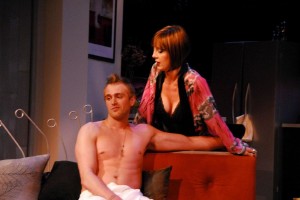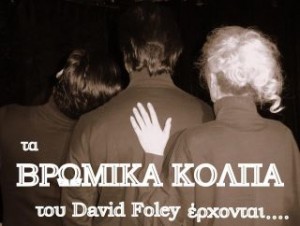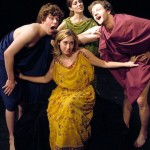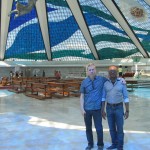A week ago Saturday I saw Richard Nelson’s lovely, understated Sweet and Sad at the Public as part of their invaluable LAB series. Someone should do a piece on the psychology of ticket prices—maybe the aesthetic psychology of ticket prices. The Public has for a couple of years been assembling casts of wonderful actors to work for a limited time on challenging new work, and charging $15 a ticket. The combined result of the work and the ticket price is something that feels for the audience like an essay—in the sense of a trial or attempt, but maybe in the other sense as well—in theatre. A jeu. Something that feels both provisional and rich. It’s as if every day were Vanya on 42nd Street.
So part of the pleasure of Nelson’s play was seeing, in an environment in which the lowered financial stakes seemed to lower other stakes as well, really good actors perform challenging new material. But another part was that it reminded you of the pleasures and uses of realism. These aren’t always obvious. I remember a play I saw in London several years ago in which real water ran from the tap and real bacon sizzled on the stove with the result that the more the design and direction insisted on the reality of the play, the less persuasive the play itself became.
It may be that realism, like poetry, works better when it uses little pins of the real to create its world, little red wheelbarrows of actuality. In Nelson’s play, we had real food, real bottles of wine, and real crocheted tablecloths—old, familial, prone to stains—to pin us to his world, each pin a recognition, but those recognitions depending for their sharpness on their separation, our ability to pick them out from the background. Not easy to do if everything—background, foreground—is composed alike of pins.
Maybe it’s that recognition, first of all, that realism provides. We see ourselves. You know that crocheted tablecloth. Your aunt or somebody’s grandmother had one; you remember it draped over somebody’s hope chest. Of course that implies that realism works best for those it actually represents. What do we lose from Chekhov when a samovar is a cultural signifier and not an everyday household item? What do we lose from Ibsen when we’ve never warmed ourselves in front of a porcelain stove?
The answer may be not much, and therefore the power of those plays doesn’t depend on realism. Or the answer may be not much, and therefore the project of realism, the recognitions realism allows, reaches beyond a particular cultural setting. I’m not sure if I’m making that distinction clear (or if I’m even clear myself about it). It’s the difference between saying, on the one hand, that realism isn’t important in Chekhov because his characters transcend their time and place and saying, on the other, that something essential to the concerns of realism, something inseparable from realism, is what makes his characters resonate beyond their immediate circumstances.
At one moment in the play, I was watching Maryann Plunkett, and there was a dizzying moment of collapse: the actress playing a character listening to a story while she ate from a plate in her lap collapsed into a woman listening to a story while she ate from a plate in her lap. I couldn’t tell the difference. It was as if I were at this dinner, the story was being told for the first time, and this woman was attending to the story with that mixture of sympathy and resistance with which we all listen to a family member tell a story. Her attention flicked between the teller and her food because, well, one must eat.
It seems like the opposite of the alienation effect. Instead of forcing you to suspend your involvement with a character by reminding you of theatrical artifice, it takes away the comforting distance of artifice, your awareness that you are watching an actor play a part and that the life of a family is being represented for you onstage. You are, in these moments, in that familial life.
What are the uses of that? Few, I suppose, if the goal of realism is just to be real. But Nelson has other things on his mind. He’s concerned with how we remember, and how remembering shapes what we do next. The play takes place on the tenth anniversary of September 11th, the dinner happening in the two hours before everyone is going to go down to the high school for a commemoration ceremony. But a teenage daughter has also died recently, and part of the family’s struggle is to keep her tragic death from reshaping their memories of her. Towards the end of the play, the uncle, who suffers from memory loss, reads Walt Whitman’s “The Wound Dresser,” the poem that gives the play its title and itself an act of re-remembering, of using memory to reshape a story of heroes and battles into one of wounds, death, longing, kisses. (This last makes me think that Bruce Springsteen’s album The Rising, with its repeated reference to “your kiss,” was consciously Whitmanesque.) “Why did the victims’ families get compensated?” Maryann Plunkett’s character asks at one point, a question that seems both loaded—so loaded she’s almost afraid to ask it—and urgent. How is that compensation an act of mis-remembering? And what consequences has that mis-remembering had? What, on this anniversary, do we need to re-remember? The questions by themselves have urgency, but their urgency for the audience comes from the way in which they’re woven into the life and concerns of this family. We can’t tell where the familial concerns end and the political ones begin.
While thinking about all this, I came across a quote from Walter Benjamin. He posits a “law of literature according to which a work’s truth content is the more relevant the more inconspicuously and intimately it is bound up with the subject matter” and suggests that “precisely those works turn out to endure whose truth is most deeply embedded in their subject matter.”
Perhaps that’s what realism does. It not only embeds its truths in its subject matter, it embeds us as well. It reminds us how tightly the threads of our lives are woven into the larger patterns. It may be the most political of all theatrical forms because it gets us where we live.

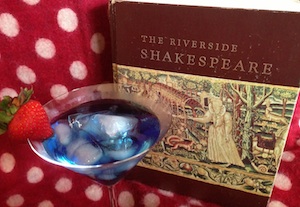 What began as a summer project and now looks as if it will take me into next spring has recently made its debut on John King’s website,
What began as a summer project and now looks as if it will take me into next spring has recently made its debut on John King’s website, 

